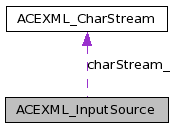ACEXML_InputSource encapsulates the actual input stream with some added information. More...
#include <ACEXML/common/InputSource.h>

Public Member Functions | |
| ACEXML_InputSource (void) | |
| ACEXML_InputSource (ACEXML_CharStream *stream) | |
| ACEXML_InputSource (const ACEXML_Char *systemId) | |
| virtual | ~ACEXML_InputSource (void) |
| virtual ACEXML_CharStream * | getCharStream (void) const |
| virtual const ACEXML_Char * | getEncoding (void) const |
| virtual const ACEXML_Char * | getPublicId (void) const |
| virtual const ACEXML_Char * | getSystemId (void) const |
| virtual void | setCharStream (ACEXML_CharStream *charStream) |
| virtual void | setEncoding (const ACEXML_Char *encoding) |
| virtual void | setPublicId (const ACEXML_Char *publicId) |
| virtual void | setSystemId (const ACEXML_Char *systemId) |
Private Attributes | |
| ACEXML_CharStream * | charStream_ |
| ACEXML_Char * | encoding_ |
| ACEXML_Char * | publicId_ |
| ACEXML_Char * | systemId_ |
ACEXML_InputSource encapsulates the actual input stream with some added information.
This class allows a SAX application to encapsulate information about an input source in a single object, which may include a public identifier, a system identifier, a byte stream (possibly with a specified encoding), and/or a character stream.
There are two places that the application will deliver this input source to the parser: as the argument to the Parser.parse method, or as the return value of the EntityResolver.resolveEntity method.
The SAX parser will use the InputSource object to determine how to read XML input. If there is a character stream available, the parser will read that stream directly; if not, the parser will use a byte stream, if available; if neither a character stream nor a byte stream is available, the parser will attempt to open a URI connection to the resource identified by the system identifier.
An InputSource object belongs to the application: the SAX parser shall never modify it in any way (it may modify a copy if necessary).
Definition at line 53 of file InputSource.h.
| ACEXML_InputSource::ACEXML_InputSource | ( | void | ) |
Default constructor.
Definition at line 7 of file InputSource.cpp.
: charStream_ (0), encoding_ (0), publicId_ (0), systemId_ (0) { }
| ACEXML_InputSource::ACEXML_InputSource | ( | ACEXML_CharStream * | stream | ) | [explicit] |
Create a new input source with a ACEXML_Char stream. Notice that ACEXML_InputSource assumes the ownership of <stream>
Definition at line 15 of file InputSource.cpp.
: charStream_ (stm), encoding_ (ACE::strnew (stm->getEncoding())), publicId_ (0), systemId_ (stm->getSystemId() ? ACE::strnew (stm->getSystemId()): 0) { }
| ACEXML_InputSource::ACEXML_InputSource | ( | const ACEXML_Char * | systemId | ) |
Create a new input source with a system identifier.
Definition at line 28 of file InputSource.cpp.
: charStream_ (0), encoding_ (0), publicId_ (0), systemId_ (ACE::strnew (systemId)) { ACEXML_StreamFactory factory; ACEXML_CharStream* stm = factory.create_stream (this->systemId_); if (stm) { this->setCharStream (stm); this->setEncoding (this->charStream_->getEncoding()); } }
| ACEXML_InputSource::~ACEXML_InputSource | ( | void | ) | [virtual] |
Default destructor.
Definition at line 43 of file InputSource.cpp.
{
delete[] this->publicId_;
this->publicId_ = 0;
delete[] this->systemId_;
this->systemId_ = 0;
delete this->charStream_;
this->charStream_ = 0;
delete[] this->encoding_;
this->encoding_ = 0;
}
| ACEXML_CharStream * ACEXML_InputSource::getCharStream | ( | void | ) | const [virtual] |
Get the ACEXML_Char stream for this input source.
Definition at line 56 of file InputSource.cpp.
{
return this->charStream_;
}
| const ACEXML_Char * ACEXML_InputSource::getEncoding | ( | void | ) | const [virtual] |
Get the character encoding for a byte stream or URI.
Definition at line 62 of file InputSource.cpp.
{
return this->encoding_;
}
| const ACEXML_Char * ACEXML_InputSource::getPublicId | ( | void | ) | const [virtual] |
Get the public identifier for this input source.
Definition at line 68 of file InputSource.cpp.
{
return this->publicId_;
}
| const ACEXML_Char * ACEXML_InputSource::getSystemId | ( | void | ) | const [virtual] |
Get the system identifier for this input source.
Definition at line 74 of file InputSource.cpp.
{
return this->systemId_;
}
| void ACEXML_InputSource::setCharStream | ( | ACEXML_CharStream * | charStream | ) | [virtual] |
Set the ACEXML_Char stream for this input source. Notice that ACEXML_InputSource assumes the ownership of <stream>
Definition at line 80 of file InputSource.cpp.
{
delete this->charStream_;
this->charStream_ = stm;
}
| void ACEXML_InputSource::setEncoding | ( | const ACEXML_Char * | encoding | ) | [virtual] |
Set the character encoding, if known.
Definition at line 87 of file InputSource.cpp.
{
delete[] this->encoding_;
this->encoding_ = ACE::strnew (encoding);
}
| void ACEXML_InputSource::setPublicId | ( | const ACEXML_Char * | publicId | ) | [virtual] |
Set the public identifier for this input source.
Definition at line 94 of file InputSource.cpp.
{
delete[] this->publicId_;
this->publicId_ = ACE::strnew (publicId);
}
| void ACEXML_InputSource::setSystemId | ( | const ACEXML_Char * | systemId | ) | [virtual] |
Set the public identifier for this input source.
Definition at line 101 of file InputSource.cpp.
{
delete[] this->systemId_;
this->systemId_ = ACE::strnew (systemId);
}
ACEXML_CharStream* ACEXML_InputSource::charStream_ [private] |
Definition at line 122 of file InputSource.h.
ACEXML_Char* ACEXML_InputSource::encoding_ [private] |
Definition at line 123 of file InputSource.h.
ACEXML_Char* ACEXML_InputSource::publicId_ [private] |
Definition at line 124 of file InputSource.h.
ACEXML_Char* ACEXML_InputSource::systemId_ [private] |
Definition at line 125 of file InputSource.h.
 1.7.0
1.7.0